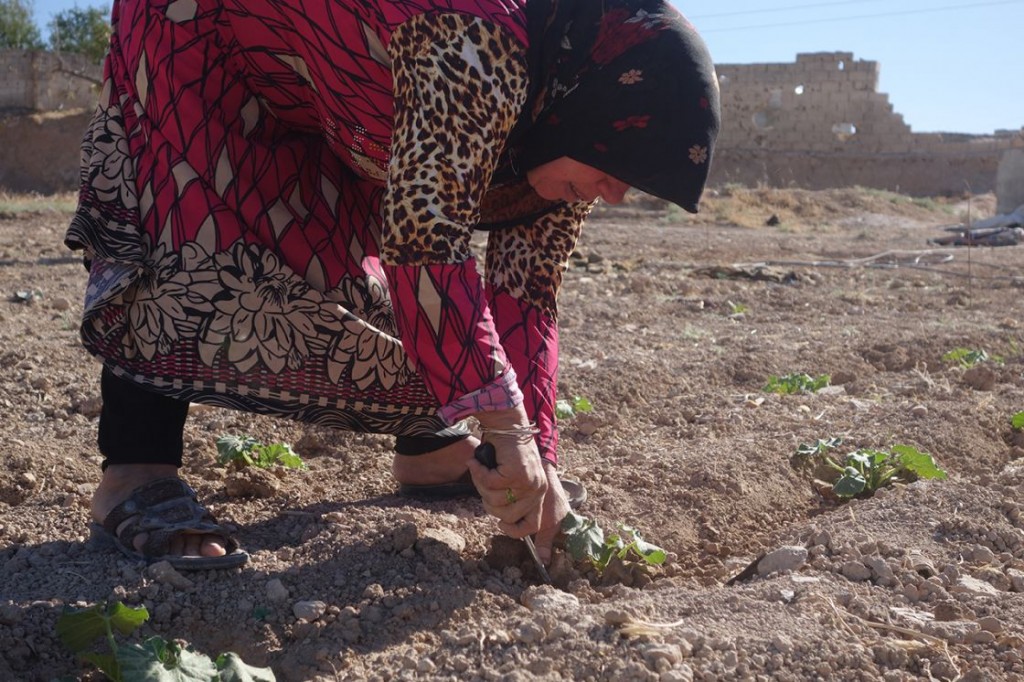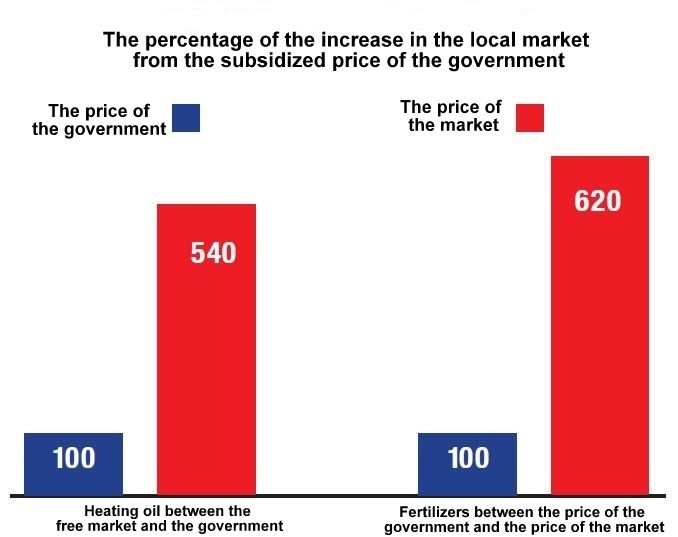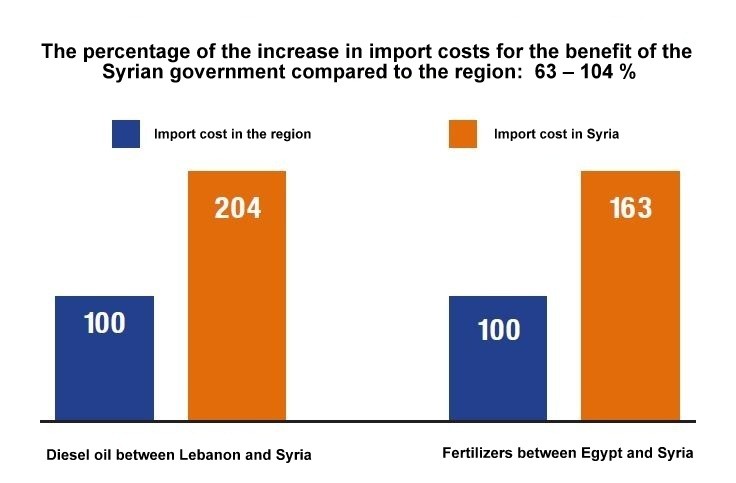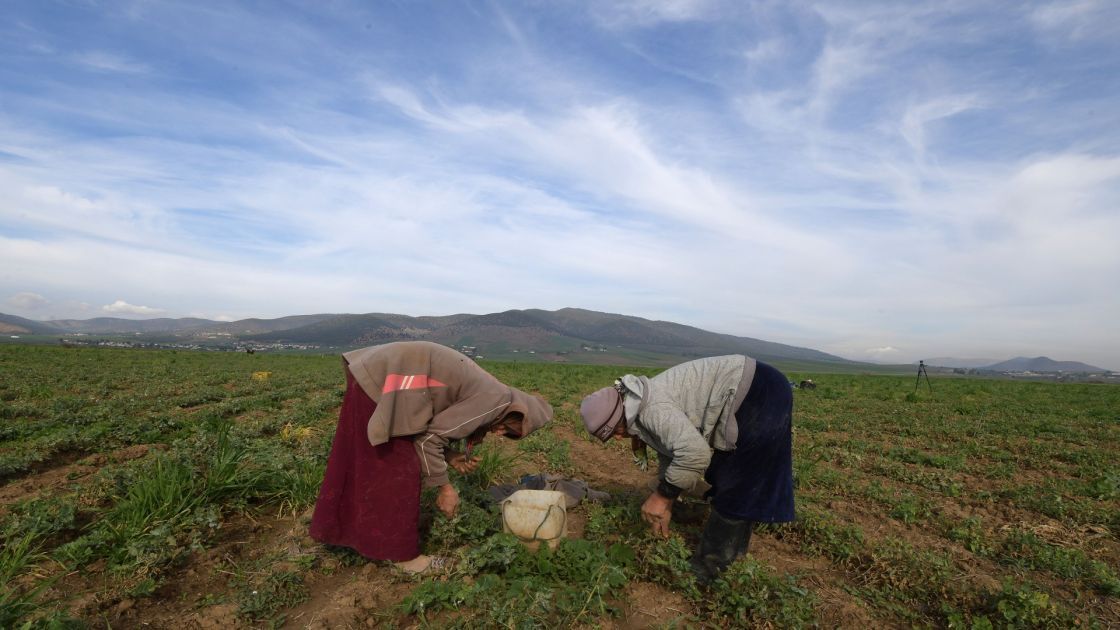- Articles
- Posted
Plundering Subsidies and Public Money; Diesel Oil and Fertilizers are Exemplars, with Proportions no Less than 50%
Some details and comparisons between the import costs of diesel oil and fertilizers, and between the costs of subsidizing them and the differences in selling them in the market, clarify which bloc of plundering public money is being talked about.
The list of basic commodities imported by the government and distributed with a subsidized price below the cost is being reduced. A group of materials remain, most notable of which are bread and diesel, in addition to fertilizers, whose distribution is currently active with the wheat growing season. These materials provide a vivid and clear example of how all the government operations and public money movement are transformed into a chain for financing corruption agencies and their associates. That is, financing a network which is a specifier and a work method, and not “individual mistakes of the weak-spirited”.
Subsidized materials are being imported through a network of importers and “import clubs”, according to the expressions of Syrian specialists, i.e., the elite privileged with securing the basics, achieving revenues from public money allocations, and the costs that are higher than international costs with a percentage that was never less than 40% in any simple calculation, whether in wheat, fuels, fertilizers, etc., and which reaches 100% (as will be illustrated later). Governments do not feel compelled to justify these costs, and the numerous questions about elucidating them have not been answered. They are mostly thrown at sanctions, without clarification on how, why, and to whom are these sanction costs being paid?! Is there really no way to decrease them? Much has been said about this without any official response, which raises suspicion about the silence following price differentials of this size in the basics. They are being paid with the public money to the importers of basic materials, amidst an austerity plan in securing the basics including bread, heating, and all sorts of energy and health, which public money is responsible for securing.
However, the issue is not limited to plundering by the higher levels of the hierarchy, and through import. Rather, the low price of these materials and the difference between the price of the market and the official price is the key to a wide plundering system.
Perhaps no media, journalism or social organization can accurately document the amount of plunder from subsidized bread, diesel, fertilizers, medications, etc., under the circumstances of restriction that hinder the environment of movement, interaction and investigation in Syria historically and until today. However, this old-new phenomenon is one of the features of the process of subsidizing materials in Syria, and the share of the networks of plundering these materials is large, which is clearly evidenced by the long queues on the bakeries for bread that lasts for 3 hours in crowded areas like Jaramana. In addition to the level of heating oil distribution, as the quantities have been reduced to 100 liters for each family, which have not been distributed yet in entire neighborhoods, villages and regions in Damascus countryside for example, and the areas in which the distribution was carried out witnessed, as everybody knows, selective distribution or just as an attempt by the State to pretend doing its have-to-do obligations. Perhaps there is no exaggeration when we say: in distributing heating oil, plundering is the rule while distributing it to families is the exception, so that the process is not fully disclosed. The same thing happens with fertilizers and the diesel oil distributed for agriculture, as the Ministry states that 70% of allocations have been distributed, while some governorates indicate, like in As Suwayda, that only 17% have been distributed.
The main point in the process of plundering from public money allocated to subsidize basic materials is price differentials, whether in import or in distribution. As the government pays the importers with a price higher than the global prices by significant percentages, and plunder networks get exceptional profit from the difference in the price paid for public money and the price received from the market, which we will talk about its estimates and its details later.

Heating Oil; Plunder of no Less than 65%
The price differential between what public money pays to importers and the global costs of importing diesel reaches 100%. That means: importers get an increase of approximately $ 0.23 for each liter of diesel, which is equivalent to 500 SP at the highest exchange rate for the government.
The quantities of importing diesel are no longer clear, but if we made estimates on heating oil only and considered that it is distributed within two months of winter by 6.5 million liters, according to the statements of the Ministry of Petroleum, then we are talking about an import bloc of heating oil that approximates at the minimum: 390 million liters, with the price differential estimated above: 195 billion SP.
Noting that the price differential has been estimated by comparing it to pricing in Lebanon, and based on the last statement of the minister of domestic trade, in which he indicated that the cost paid from the government to import diesel oil approximates 1000 SP per liter, i.e., $ 0.45 per liter with the highest governmental exchange rate. Whereas in Lebanon, official pricing for the imported liter approximates: $ 0.22, according to the official price which is 3850 Lebanese pounds to USD. That, of course, including the costs of import, transportation, shipping, and the profits of the network of monopolizing the import of fuel in Lebanon.
On the other side of plundering through price differentials, we can make an estimate of the bloc of profits achieved from plundering heating oil sold at 185 SP per liter, and selling it in the Syrian market with a price of approximately 1000 SP per liter. That is: the profit in each liter approximates 800 SP. So, if the share of corruption networks from diesel oil distribution did not exceed 20%, which is a small percentage according to the reality of distribution, then we are talking about a profit bloc that approximates 60 billion SP. That is only if the share of the networks of plundering distribution did not exceed 7.8 million liters within two months. The share is even more than that, as the allocations of the state apparatus are stolen from the source, as was shown in imported wheat, of which 500 tons are missing in the port!
According to this estimate, if the government has been paying 390 billion SP to import this bloc of heating oil only, then the share of plunder from it is no less than 65%.

Fertilizers; Plunder of no Less than 54%
The process of distributing fertilizers expands in this time of the year, as wheat areas are being cultivated during this month. The Ministry states that it exceeded one million hectares. Price differentials in both sides are also large in fertilizers.
First, in import (as Urea fertilizer is being imported while the fertilizer plant has been stopped for reasons unknown reasons, after its monopoly contract has been signed)! The difference in the price paid from the government to importers and the global price of a ton of fertilizer reached more than $ 200 per ton, i.e., approximately 450 thousand SP, including costs and unexplained additional profits in the price of the ton paid to the importer from public money.
The Ministry of Agriculture states that the government pays 1.2 million SP; the cost of importing one ton of fertilizer arriving to the Syrian ports, i.e., what is equivalent to $ 450 with the highest governmental exchange rate. This price is very high compared to the price of Urea in the region. If we took Egypt as an example, the price of one ton there is approximately $ 330, which is close to the export price in Turkey and China for Urea fertilizer, with an amount of approximately $ 316–322 per ton in 2018 according to the data of FAO. Both countries are the main import destination for Syria.
On the other side of plundering through local distribution networks, price differentials are important and attractive. The government sells one ton of fertilizer to farms for 193 thousand SP on average for Urea, while its price in the market reached 1.3 million SP, also according to the statements of the minister. Which means, a profit of 1.1 million SP per ton!
Until now, the government distributed approximately 85 thousand tons of fertilizer for wheat cultivation as a down payment, also according to the statements of the minister of agriculture in the people’s assembly. The share of importers and influencers from this down payment is an unexplained profit of approximately $ 17 million, which is about 38 billion SP.
As for the share of the networks of plundering subsidized fertilizer allocations, if we assumed it does not exceed 20%, then it reaches a profit of approximately 18 billion SP.
So, if the government agreed on importing this batch of fertilizers with approximately 100 billion, then the share of the additional costs and plundering through import and distribution networks is no less than 54%.

Conclusion
The government states that its budget expenditures will amount to 8000 billion SP, and that the share of subsidies in this budget will reach approximately 4000 billion SP. If those subsidies were spent, then they are to a large extent illusional. This does not mean that they are not paid, but it means that they are being paid without achieving the purpose of supporting production and the consumption of the basics except at the minimum levels. They rather achieve another purpose, which is financing wide squander networks, whether through inflating import costs, or through plundering allocations and selling them at the price of the market.
The two examples of heating oil and Urea fertilizer explain a lot. Both are two materials with import costs higher than the prices in Lebanon and Egypt by a rate between 63% reaching 100% of unexplained additional costs on the import bill, which the government pays to narrow import clubs that only those who are “influential and significant” can be privileged with their deals. It is considered as subsidies that the government never tires from talking about and harping on “the fact that they did us a favor”, while it is just an unexplained additional cost, most of which may be profits of the high plundering groups.
On the other side of plundering these two materials, distributing subsidized materials is the source of financing a wide network of corruption and mercenary, which occurs through the difference between the low price of the government and the high price of the market. This makes profits for these networks at a rate of 450 – 520 % of pure profit compared to the cost. These rates are an incentive to mobilize all networks of influence, militias and bureaucracy to get a share.
If the government spends 390 billion SP on heating oil within two months, then the share of unexplained plunder or squander in both ways is no less than 250 billion SP. If it spends approximately 100 billion on the first batch of fertilizers distributed until now, then the lost share of it is no less that 54 billion SP.
According to this measurement and with a simple calculation, 4000 billion SP for subsidies can be transformed if it was really spent to more than 2000 billion SP to the networks of plunder and squander.
There must be a conflict surrounding the faces of power, squander and influence in managing public money. Some want to eliminate subsidies, liberalization of the market, and use squander as an excuse, indifferent about the effects of raising the prices of energy, fertilizers, and medicines that can aggravate humanitarian disasters in Syria; partially raising the price of diesel oil last month led to raising the prices of local fruits and vegetables by approximately 28%, according to some estimates! While other sides and parties hold on to subsidies for a basic purpose: the share represented by plundering public money from basic allocations, the organized process that leads to the non-arrival of subsidies to consumers, and the arrival of at least a similar bloc for sale in the market, which makes an easy and exceptional profit source and enhances the network of plunder that runs the state apparatus through importing and distributing.
Plundering subsidies is a political dilemma, not just an economic one. Keeping subsidies is a political and social necessity to ward off more disasters. Rooting out plunder is a political task because it threatens society and what remained of the state apparatus’ role, and pushes towards more militia financing and chaos. The solution to this dilemma is neither through supply monitors nor by price liberalization. It requires the effort of an entire society to be able to control public money, the destinations of its expenditure, monitoring its distribution and holding accountable those who plunder it. It requires a different social and political structure to ward off the disaster, which the organized plunder of public money only represents one of the aspects of its persistence.



 ashtar mahmoud
ashtar mahmoud